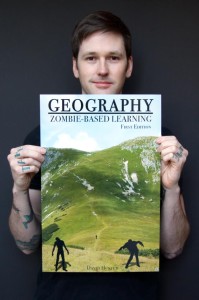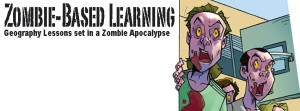David Hunter is teaching geography to middle school students using zombie-based learning
If you’re like most, you probably don’t remember much from your middle school social studies class. Not because you weren’t paying attention, but because it wasn’t memorable. Studying geography alone was boring, and rarely were you presented a meaningful context to apply the information learned. David Hunter, a 6th and 7th grade geography teacher at Big Picture School in Bellevue, Washington has developed a curriculum to address those issues and is changing the way fellow educators, state officials, and the National Council of Geographic Education approach building future curriculums.
Mr. Hunter’s class is primarily project based functioning similar to the way a game works, including explicit tasks, consistent feedback, and a single theme: zombies. The curriculum, titled “Zombie-Based Learning: Geography Lessons Set in a Zombie Apocalypse”, replaces the standard textbook with a zombie-based graphic novel and implements aspects of gamification into its lessons.
David first began developing the course after attending a Big Picture Learning Conference where teachers discussed finding more effective ways of engaging their students. One teacher mentioned a student of their’s was interested in zombies and wanted to include a text or film that dealt with that topic in their class. Instead, David decided to integrate the entire concept of zombies into his own teaching.

The response to the curriculum from both parents and administrators was surprisingly positive given the school district’s “traditional history”. Students also reacted well to the unique teaching format. “I always get the comment, ‘well, obviously the boys are going to be into it,’ but the girls were also very interested,” Hunter said. “I would get girls asking ‘when are we going to do the next lesson?'”
Typically, the class is set up so that the students can interact through projects that require them to complete activities or research particular topics together. But the curriculum itself is flexible and easy to implement in any classroom. “I wanted to design the curriculum to be easy for any teacher to adopt”. Included are what David calls “exit tickets” or something the student does that day to show they’ve met the current objective.
Of particular note is the graphic novel “Dead Reckon”, designed by David and a team of professional artists as a way of establishing the narrative for the class. He describes it as the story that constructs both the purpose for the class and the scenarios of the zombie apocalypse where the geographic skills are applied. Within Dead Reckon, the characters encounter geographic topics that actual geographers study, including community planning, migration patterns, and physical systems such as landforms and climate.

When asked how he accommodates for students who are less interested in zombies, Hunter responded with the following: “What do you do if you’re teaching regular geography and you have kids who aren’t into regular geography? Then you don’t have anywhere to start from. At least by starting with an interest, like zombies, you can hook a bunch of kids and then provide plenty of other examples”. David also notes that within a daily lesson it’s possible to teach without ever talking about zombies and focus on just geography.
Yet David points out that the students are able to relate to the fantasy zombie world more than their own town. “The real world has a lot more complicated and abstract things,” David comments, “but the fictional world is boiled down to a level that is more suitable for middle school.”
Although zombies serve as the context for the class, David encourages teachers to relate the zombie-based material back to the real world. Hunter says “it’s really important to discuss and think about the real world applications”, but adds that the students typically make these connections on their own.
The curriculum has received attention from nearby school districts who have decided to teach the course as well. Just this week, the state of Alabama is considering to adopt the curriculum for all middle school students statewide. Furthermore, the National Council of Geographic Education, from which Zombie-Based Learning bases its standards, has said it was the best geography curriculum they have seen.
Ultimately David hopes that by making his classroom more engaging, student won’t experience geography and social studies in a way that’s similar to how he and many others did. “People ask, ‘do you think it’s the zombies that make it exciting?’ I think the thing that makes it exciting are people thinking how you could learn something that wasn’t extremely boring. How you could learn and actually enjoy [the material], and have it be memorable”.
Click here to check out David Hunter’s most recent kickstarter campaign










All I know is that if I had learned through zombie-based projects, I would have definitely done better in and out of school. Great article Aiden!
Zombies are taking over.
This is a brilliant example of how serious education can move away from the traditional, stale and uninspiring form, and adapt to a more entertaining and motivating format.
Wow! What a great story. Zombies are definitely the “it” thing right now, but creating your own curriculum around them! Amazing! Now I’m thinking zombie physics, anyone?
Very ingenious, very clever! However, I’m a bit worried about the collateral learning that will inevitably occur as a result. The Zombie concept is mostly popular today because it makes intense, gory violence towards humanoids more acceptable. “They’re not humans, so it’s OK to blow their heads off with shotguns”. I’m old enough to remember some similar attitudes happening during the Vietnam war and have heard plenty of horrific, dehumanising stories from earlier wars, where enemies (or civilians) were regarded as non-humans as well.
Popularising this attitude through fiction is likely to translate to similar attitudes towards outgroups. Social psychology is replete of experiments that demonstrate this effect (e.g., http://en.wikipedia.org/wiki/Stanford_prison_experiment).
We need to be careful. In every fad is hidden a powerful ideology, a “hidden curriculum” that will be taught as well, if not better, than the explicit subject matter.
Spanish Translation:
David Hunter está enseñando geografía a estudiantes de secundaria usando ‘Zombie-based learning’
Aunque te gustaran mucho en su momento, lo más probable es que no recuerdes mucho de tus clases de humanidades de secundaria. No porque quizá no prestaras la suficiente atención, sino porque no eran fáciles de recordar. Estudiar geografía tal cual es aburrido, raramente te la enseñan como algo que puedas aplicar en tu vida diaria. David Hunter imparte geografía a estudiantes de 3º y 4º de ESO en el Big Picture School en Bellevue, Washington ha desarrollado un curriculum académico para hacer frente a estas cuestiones y cambiar la forma en que los educadores, funcionarios públicos y el Consejo Nacional de Educación en Geografía enfocan sus futuros curriculums.
Las clases de Hunter funcionan principalmente de forma similar a cómo lo hace un juego, incluyendo tareas explícitas, feedback robusto y un tema concreto: zombies. El curriculum, titulado “Aprendizaje basado en Zombies: Lecciones de Geografía en medio de un Apocalipsis Zombie”, reemplaza los libros de texto estándares con una novela basada en zombies e implementa aspectos de gamificación en sus lecciones.
David empezó a desarrollar su curso después de asistir a la Big Picture Learning Conference en donde los educadores discutían sobre cómo encontrar caminos más efectivos para involucrar más a sus estudiantes. Un profesor mencionó que uno de sus estudiantes estaba muy interesado en la temática zombie y cómo quería incluir texto o películas al hilo en sus clases. Por su lado, David decidió integrar por completo el concepto de los zombies en sus propias clases.
La respuesta al curriculum fue sorprendentemente positiva tanto por parte de los padres como de la administración, dados los ‘antecedentes tradicionalistas’ del instituto. Los estudiantes también reaccionaron bien a este nuevo y único formato. “Siempre me decían, ‘bien, es obvio que los chicos se sentirán motivados’, pero las chicas también se interesaron” comenta Hunter. “Tengo a las chicas preguntando ‘¿cuándo va a ser la próxima lección?'”
Frecuentemente, las clases están diseñadas para que los estudiantes puedan interactuar con los proyectos que lo requieren de forma que para completarlos tengan que trabajar los temas juntos. Por otro lado el curriculum es de por sí basante flexible y fácil de implementar en cualquiera de las clases. “Yo quería diseñar el currículum para que pudiera ser adaptado con facilidad por otros profesores”. Se incluye también lo que David llama “tickets de salida”, o algo que los alumnos hacen ese día en el que localizan el objetivo común.
Particularmente interesante es la novela gráfica “Dead Reckon”, diseñada por David y un equipo de artistas profesionales como la forma de establecer la narrativa para las clases. Él la describe como la historia configurada para sostener tanto los propósitos de su clase como los escenarios del apocalipsis zombie en donde se aplican los objetivos curriculares en geografía. En “Dead Reckon” los personajes se encuentran con temas estudiados actualmente por geógrafos, incluyendo planificación, patrones de migración y sistemas físicos como accidentes geográficos y climáticos.
Cuando le preguntamos cómo se adapta a aquellos estudiantes menos interesados en la temática zombie, Hunter responde: “¿Qué deberías hacer si eres un profesor enseñando geografía y tienes alumnos que no están interesados en ésta? En esa situación no tienes ningún punto desde el que comenzar. Al menos iniciando con algo interesante, como los zombies, puedes tener cierto gancho con un primer grupo de alumnos y entonces tener opciones para otros ejemplos”. David también indica que ahora en las lecciones diarias es posible enseñar incluso sin hablar sobre zombies y centrarse exclusivamente en geografía.
David añade que los estudiantes están más dispuestos a relacionarse con la fantasía del mundo zombie que con su propia ciudad. “El mundo real es mucho más complicado y abstracto”,”pero el mundo de la ficción lo reduce todo a un nivel más adecuado para la escuela secundaria”
Aunque los zombies sirven como un contexto para la clase, David alienta al profesorado a relacionar el material basado en temática zombie con el mundo real. Hunter dice “es verdaderamente importante discutir y pensar sobre las aplicaciones en el mundo real”, pero los estudiantes muchas veces haces esas conexiones por sí mismos.
El diseño curricular ha recibido atención de otros distritos educativos cercanos, los cuáles han decidido enseñar este curso también. Sólo esta semana en Alabama está considerando adoptarlo para todos los centros de secundaria del estado. Además, el National Council of Geographic Education, del que este programa de Zombie-Based Learning toma sus estándares, ha asegurado que es el mejor curriculum que ha pasado por sus manos hasta la fecha.
Para finalizar, David cree que haciendo sus clases más atractivas los estudiantes no experimentarán la geografía ni los estudios de humanidades como lo hicimos generaciones anteriores. “La gente me pregunta ‘¿piensas que son los zombies los que hacen esto excitante?’ pero yo creo que lo que hace esto excitante son las personas que se preocupan por cómo aprender de una forma que no sea tan terriblemente aburrida. Como poder aprender algo disfrutando (el material) y conseguir que quede en la memoria.
Clica aquí para ver la campaña de David Hunter en Kickstarter
Another great example of implementing video games into education process,especially with zombie thematics which is very “in” these days.I can imagine my kids who are crazy about “Walking Dead” series or some zombie games how they will react to this.Impressive.